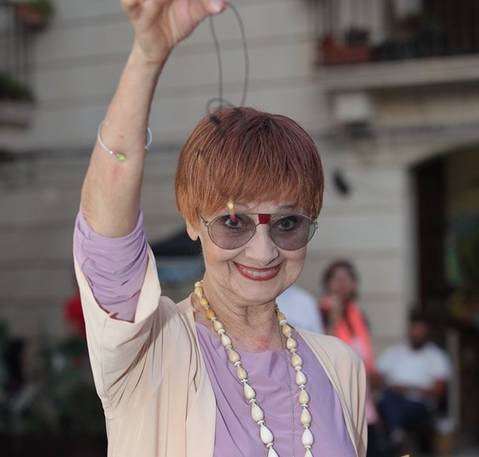


An eclectic and versatile actress, Milena Vukotic, born in 1935, is amongst the most beloved stars of Italian cinema, theatre, and television. Her film debut took place in 1960 with Damiano Damiani [2]’s Il Sicario. She has worked in over 120 films with masters such as Monicelli [3], Fellini [4], Lina Wertmüller [5], Lattuada [6], Lizzani [7], Dino Risi [8], Bertolucci [9], Tarkovskij [10], Oshima [11], Buñuel [12] and in the popular Fantozzi [13] film series alongside the iconic Paolo Villaggio. Throughout her extensive career, she made every character she portrayed her own. In theatre, she worked with the likes of Strehler [14], Zeffirelli [15], Enriquez, Paolo Poli and received the Eleonora Duse Prize in 2002 and the Flaiano Lifetime Achievement Award in 2014. Memorable her performances in Lina Wertmüller’s Lasciami Andare Madre, Regina Madre with Antonello Avallone, and Sorelle Materassi by Geppy Gleijeses. Now, she wins yet another award in addition to the numerous ones conquered over the years.
Milena Vukotic received the Sangemini Special Lifetime Achievement Award at the 11th edition of the Ortigia Film Festival in the town of Siracusa.
You worked with the histrionic Federico Fellini, which had been a fundamental figure for you ever since you saw La Strada for the first time in Paris.
I was studying dance and theatre in Paris when one day I saw La Strada by Fellini, and it’s that moment that sparked my interest for cinema. During that time, I was looking for fresh inspiration. That film was a sign of fate. And so I dropped everything and returned to Rome with the desire to meet him. Back then, I would’ve never imagined that Fellini would forever be a part of my life.
Can you tell us about your first encounter?
In Rome, I took my first steps in TV with Lina Wertmüller’s Gian Burrasca. For my meeting with Fellini, I had a letter of introduction with me, which remained in my pocket because he immediately put me at ease. And then there was my first role in one of his films: the 1967 Giulietta degli Spiriti.
What kind of relationship did you build over the years?
Fellini was able to bring out parts of me I didn’t even know were there. And that’s also why we formed an authentic bond. With him and with Giulietta Masina. What united us wasn’t just artistic collaboration, but also a profound friendship which marked my life. I admired him immensely. One day I visited the set of Ginger and Fred and I was mesmerized by the magic of his direction. Federico was very joyous and funny. You laughed a lot around him. Our encounters were always a big party.
Do you see his heir in any American director?
No. For now I can’t think of anyone with his talent and visionary ability to interpret reality. Fellini was unique and will remain so in the history of art. The emotions he made me feel are indescribable. Every time I watch his films I see in them the genius of global cinema. His masterpieces influenced entire generations of directors, and in the United States there are still many who take inspiration from his most iconic film, La Dolce Vita.
If you had been an American actress, who would you have wanted as a director?
Woody Allen, definitely. Like Fellini, he is unique and inimitable. They have both been controversial figures but gifted with an extremely clear outlook on reality and a dissacrating voice.
How has contemporary cinema changed?
There is much talent in Italy but the economic and social problems and the presence of a divided government unable to sustain cinema are keeping a resource such as the Italian film industry from becoming a driving force of the country’s economy. It’s not an easy time for Italy, in fact, I believe it might be one of the most disastrous, but the innate sense for art that has marked our culture for millennia will help our Bel Paese to regain its past glory.
The movie industry has been the scene of many scandals in the past years. The most infamous of which gave birth to the MeToo movement. What are your thoughts?
The history of cinema is made of scandals. Situations such as the ones denounced by the movement have always existed and continue to take place. But it’s good that we are talking about this today and that certain facts have emerged. Yet, I don’t think it will cause the power dynamics between producers, directors, and actresses to change much. And there is also still much work to be done regarding the issue of equal pay, which in the United States is a hot source of debate amongst male and female colleagues. But I want to be optimistic and hope that the first victories will soon arrive.
Source URL: http://test.iitaly.org/magazine/focus/art-culture/article/milena-vukotic-fellini-changed-my-life
Links
[1] http://test.iitaly.org/files/vukotic2jpg
[2] https://en.wikipedia.org/wiki/Damiano_Damiani
[3] https://en.wikipedia.org/wiki/Mario_Monicelli
[4] https://en.wikipedia.org/wiki/Federico_Fellini
[5] https://en.wikipedia.org/wiki/Lina_Wertm%C3%BCller
[6] https://en.wikipedia.org/wiki/Alberto_Lattuada
[7] https://en.wikipedia.org/wiki/Carlo_Lizzani
[8] https://en.wikipedia.org/wiki/Dino_Risi
[9] https://en.wikipedia.org/wiki/Bernardo_Bertolucci
[10] https://en.wikipedia.org/wiki/Andrei_Tarkovsky
[11] https://en.wikipedia.org/wiki/Nagisa_Oshima
[12] https://en.wikipedia.org/wiki/Luis_Bu%C3%B1uel
[13] https://en.wikipedia.org/wiki/Fantozzi_(film)
[14] https://en.wikipedia.org/wiki/Giorgio_Strehler
[15] https://en.wikipedia.org/wiki/Franco_Zeffirelli